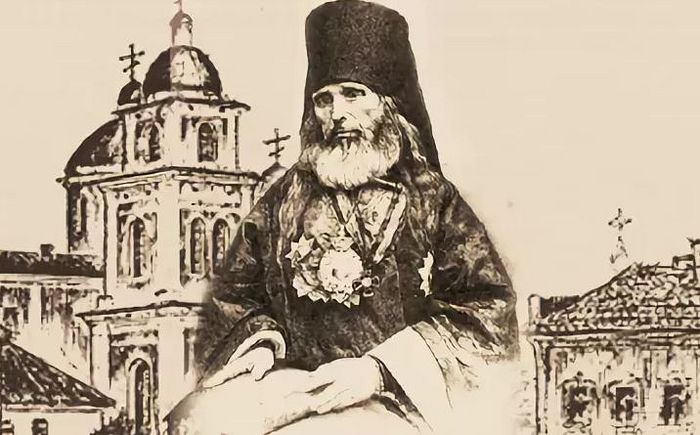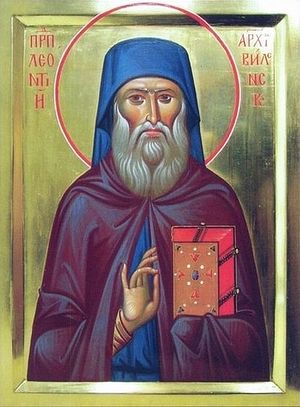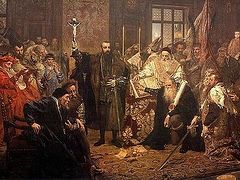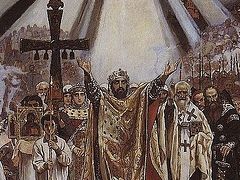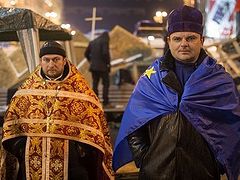The period of the Union of Brest caused severe trials for Orthodox faithful in Belarus (“White Russia”). The Church discord that was accompanied by a struggle for churches, the persecution and expulsion of Orthodox priests, spoken and print disputation, and physical violence had a depressing effect on people’s spiritual life. Attendance at church on major festivals was full of hazards: Believers could be insulted or even get hit on the back with a stone at any moment. An atmosphere of tension reigned supreme in cities where there were many Catholics. Insults and assaults were a common occurrence there, whereas appealing to the law was ineffective as the judicial system was chiefly in the hands of Roman Catholics and Uniates.
Vilnius, the capital city of the Grand Duchy of Lithuania, became an arena of intensive religious struggle. There was an Orthodox brotherhood there that supported a school, a print shop, and almshouses. When the Holy Trinity Monastery was transferred to the Uniates, the Orthodox brotherhood settled down at the Holy Spirit’s Monastery. The first abbot of this monastery, the Venerable Leontius/Leonty (Karpovich), became a true spiritual leader of the Orthodox. He set an example of steadfastness in the faith, of the humility of a monk, the wisdom of a teacher, the professionalism of a printer, and the profundity of a preacher. Greatly appreciated by his contemporaries, the Venerable Leontius is sadly little known in Belarus in our days.
The future monk was born in Pinsk in what is now Belarus, in about 1580, and was baptized with the name Longinus. As a son of a gentry family, he naturally received a good education. Longinus most probably went to an Orthodox school in either Ostrog or Vilnius. In addition to Church Slavonic and Polish, during his studies Longinus also mastered Latin and Greek. Upon completing his studies, Longinus worked as a printer at the brotherhood’s printing house in Vilnius under the direction of the prominent preacher and polemicist Stephen Zizanij. From the very beginning of the Union of Brest the Vilnius brotherhood (among its members were not only middle-class city residents but also representatives of the Grand Duchy’s different noble families) joined the anti-Uniate campaign. The brotherhood was immediately subjected to persecution for that. Stephen Zizanij was forced out, the brotherhood’s priests were brought before the court and eventually sentenced to banishment, and the brotherhood’s church was seized by the Uniates. In 1597, the new Church of the Holy Spirit, built on the land of the influential Volovich (also Wolowicz) family, opened in front of the Holy Trinity Monastery that had been taken over by the Uniates. The Orthodox brotherhood carried on its activities. Then the Uniate Metropolitan Hypatius Potsei (Pociej) (1541-1613) arrived in the city in order to break the spirit of Orthodox residents of Vilnius. Within five years of an unequal struggle all the Orthodox churches were transferred to the Uniates except for the newly-built Church of the Holy Spirit. However, soon all the churches seized by the Uniates were damaged or destroyed in a devastating fire…
In 1609, the brotherhood’s envoys were dispatched to the Warsaw Sejm to complain about the persecutions. Longinus (Karpovich) was among them. The envoys returned home absolutely unsatisfied. After the journey Longinus received the monastic tonsure, taking the name Leontius, and was ordained a priest. In the following year the brotherhood’s printing house published the book, Frinos—that is, The Lamentation of the Eastern Church, by Meletius Smotritsky [1577-1633; a noted spiritual writer, Church and public figure, and the future Archbishop of Polotsk]. It skillfully denounced the extremes of the Catholic teaching and the declared Union. It read: “Trying to change the faith of the Russian people means destroying the Russian people…” The book provoked the king’s indignation and that of Catholic zealots. It was ordered that all the printed copies be burned and the publishers arrested. The Uniates captured St. Leontius and threw him into an earth pit, where they not only let him languish for two years but also tried to force him into the Union.
The trying ordeal undermined the saint’s health but didn’t break his spirit.
After his release in 1612, the Venerable Leontius (Karpovich) became a genuine spiritual leader of Orthodox Christians living in Vilnius and far beyond. As archimandrite of the Orthodox monastery that was established at the Church of the Holy Spirit he introduced a monastic rule in it. During his abbacy, the monastery of Vilnius set a good example to all the other Orthodox monasteries in both Lithuania and Belarus. The venerable man celebrated services and took Communion daily; he would pray earnestly during services and gave prayer his full concentration. His example helped revitalize monastic life.
Under Fr. Leontius (Karpovich) the brotherhood’s printers annually published books for liturgical use. The publication of The Slavonic Primer (Vievis, 1618) and The Grammar (Vilnius, 1619) by Meletius Smotritsky was especially important. In 1617, the construction of a new stone five-year school attached to the brotherhood was finished, and Fr. Leontius (Karpovich) became its principal.
No wonder that the new oasis of spiritual life caused the concern of both Roman Catholics and Uniates. Insults to the Orthodox faithful became an everyday occurrence. Orthodox believers were repeatedly pelted with stones and shot at with arrows on their way to the Holy Spirit Monastery. In 1614, the Venerable Leontius was wounded by a piece of brick. The Uniate clerics Paisius Onikeevich and Josaphat Kuntsevych, the future Uniate “saint”, were involved in this attack. In word and deed the venerable man called upon his flock not to repay evil with evil and to wholeheartedly follow Christ, Who was abused, scourged and persecuted, but didn’t retaliate against His enemies even unto death. His example of meekness earned him the respect even of the sober-minded heterodox. However, the words of the archimandrite of Vilnius enraged the opponents of Orthodoxy. His published homilies were being destroyed. Only two homilies by Fr. Leontius (on the Transfiguration and the Dormition) along with his sermon on the Sunday before the Nativity have survived to the present day in a collection of manuscripts in Kiev.
In 1620, Patriarch Theophanes III of Jerusalem (1608-1644) arrived in Kiev and accepted the Cossacks’ repentance for their outrages at the time of disturbances in the Russian state, forbidding them to war with Orthodox Moscow henceforth. Besides this, the patriarch complied with the request to consecrate new Orthodox bishops of Rzeczpospolita [the Polish-Lithuanian Commonwealth once referred to in everyday speech] as the two bishops who had rejected the Union at the Council of Brest were now dead. Under Cossack protection, Theophanes III agreed to restore the Orthodox hierarchy of the Kievan Metropolia.
One of the candidates for bishop was Archimandrite Leontius (Karpovich), but unfortunately he was confined to his bed by his illness at that time. He sent Meletius Smotritsky as a candidate for bishop in his stead. St. Leontius reposed in the Lord on September 24/October 6, 1620.
Fr. Leontius’s contemporaries venerated him as a saint and referred to him as a “holy elder”, although he didn’t reach the age of forty. His body remained incorrupt. He was locally venerated for a long time, and this tradition was maintained even by twentieth-century immigrants. In 2011, by the decision of the Holy Synod of the Belarusian Orthodox Church, the Venerable Leontius (Karpovich) was officially canonized. Thus the Church recognized him as a model of patience and meekness in the period of persecution and discord of that cruel age.

